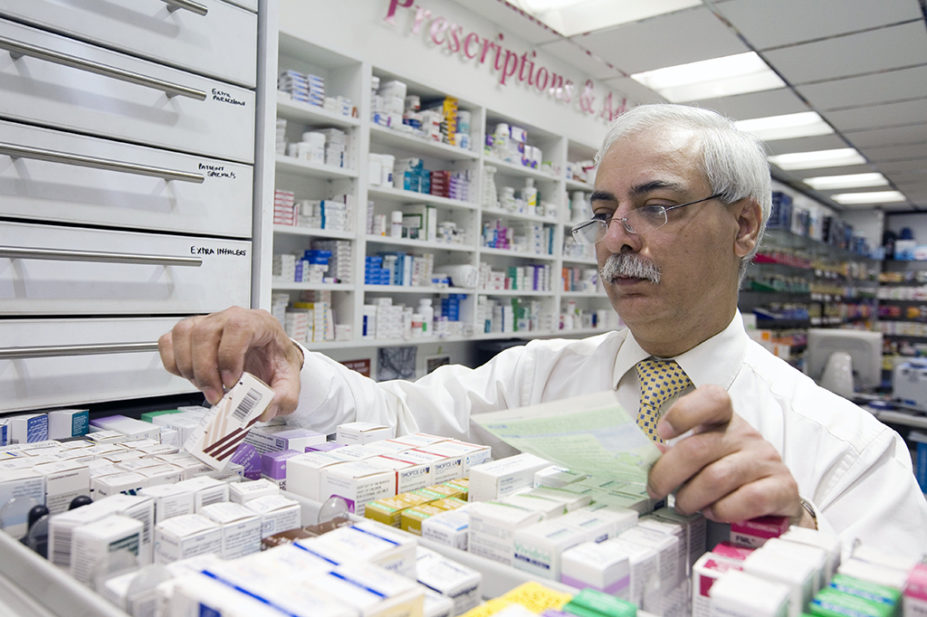
MARK THOMAS/SCIENCE PHOTO LIBRARY
At the end of 2022, community pharmacy teams experienced a new level of chaos and confusion around medicines shortages.
Worried parents with unwell children swarmed pharmacies in search of antibiotics to fight Strep A, after rising rates of the virus led the NHS to advise GPs to lower their threshold for prescribing the likes of penicillin and clarithromycin.
The supply chain could not keep up. Community pharmacists soon found their stocks depleted, as they faced irate patients, rising medicine costs and a lack of support from the government, which maintained that there was “no supplier shortage of antibiotics available to treat Strep A”.
It was nearly two weeks before the government conceded and issued the first of eight ‘serious shortage protocols’ (SSPs) for phenoxymethylpenicillin on 15 December 2022 — all of which are still in effect.
SSPs were introduced in October 2019, allowing pharmacists to respond to a medicines shortage in one of four ways specified within the protocol: by dispensing a reduced quantity; a therapeutic equivalent; a generic equivalent; or an alternative dosage form of the drug.
The measures were proposed during a one-week consultation period with pharmacy bodies, as part of preparations for a ‘no-deal’ Brexit in 2018. The consultation, published on 5 December 2018, said SSPs would be “drafted as a reserve power that would allow ministers to issue SSPs during any serious national shortage, not just for potential supply shortages in a ‘no deal’ scenario”.
Since then, the government has published a total of 50 SSPs for medicines with supply problems, more than two thirds of which (33) came into effect in 2022.
But community pharmacists’ use of the protocols has not kept the same pace, with pharmacists describing a “cumbersome” and inflexible system that may not be the answer to every medicine shortage facing the UK.
In response to a freedom of information request by The Pharmaceutical Journal, received on 23 January 2023, the NHS Business Services Authority (BSA) revealed that pharmacists dispensed 68,028 items using an SSP between October 2019 and October 2022.
This was largely driven by a flurry of antidepressant dispensing, with seven different forms of fluoxetine accounting for 57% (38,844) of all SSP items dispensed in that time (see figures).
Recently, however, the rate at which pharmacists are using SSPs has fallen sharply. In the year to October 2022 — the latest available data — the number of items dispensed by community pharmacists using an SSP was nearly 70% lower (12,814 items) compared with the number of SSP items dispensed in the year to October 2021 (38,653 items).
This is despite a four-fold increase in the number of SSPs issued by the government over that time, largely reflecting its efforts to manage persistent shortages of hormone replacement therapies (HRTs).
In April and May 2022, the government issued 13 SSPs to limit the amount of HRT product that could be dispensed to a patient and enable pharmacists to provide alternatives where clinically appropriate.
But, while the substitutions required for the fluoxetine SSPs were described as “straightforward”, switching HRT was a different matter.
The relative inflexibility of SSPs as an instrument meant that pharmacists often had their hands tied
Graham Stretch, president of the Primary Care Pharmacy Association, chief pharmacist at Argyle Health Group, and clinical director at Brentworth Primary Care Network
“That caused a lot of frustration,” says Graham Stretch, president of the Primary Care Pharmacy Association, chief pharmacist at Argyle Health Group and clinical director at Brentworth Primary Care Network.
“I don’t think they allowed sufficient freedom for pharmacists to use [the SSPs], or the pharmacists’ didn’t feel well informed enough about a patient’s situation.
“The relative inflexibility of [SSPs] as an instrument meant that pharmacists often had their hands tied and GPs just don’t understand the way the rigid instruments work because they’re used to having the freedom [to prescribe],” he says.
“And, I think, on the patients’ side, there’s often a trust issue as well. That’s something that we as a profession have to work on.”
While SSPs are available for pharmacists to use, it is not a requirement. NHS BSA guidance states that pharmacists should “use their professional judgement to consider whether supplying in accordance with an SSP… is reasonable and appropriate for the patient”.
Patients are also able to refuse an alternative medicine “and be directed back to the prescriber”.
Instead, Stretch says some patients went “to Paris just to get their HRT” because they could not get their usual brand from the pharmacy.
Prescribing habits
The drop in SSP use in 2022 could also reflect a change in GP prescribing over time, according to Gordon Hockey, legal director at the Pharmaceutical Services Negotiating Committee (PSNC).
“SSPs can be a useful tool to help mitigate significant supply disruptions, but they are not always used,” he says. “For example, once a supply issue is well known, such as with HRT products, GPs may change their prescribing habits to request the alternative formulation or product on prescriptions, thereby passing the need to use an SSP.”
However, where they are used, Hockey describes SSPs as “complex and time-consuming”.
SSPs had been expected to have a “neutral” impact on the sector, according to an explanatory memorandum that accompanied the legislation supporting the set-up of SSPs in February 2019.
“There will be cost savings from not having to liaise with GPs, but community pharmacies will need to inform the GP when they dispense against a protocol and they may also be required to do some further checks that they would not do when dispensing against a prescription,” it said.
But Hockey says that some patient medication record systems “do not cope well with the endorsement process”, adding that if a pharmacist makes an error when claiming for the SSP “there is the potential for a contractor to lose out”.
For each SSP-endorsed prescription — in which pharmacists can supply multiple alternative items at once — contractors earn £5.35. This means that in the past four months for which data is available, pharmacists have earned £21,769 after making 4,069 SSP fee claims.
However, Nat Mitchell, pharmacist and director at JWW Allison and Sons pharmacy in Cockermouth, Cumbria, says that using SSPs are so “cumbersome, especially when you’re not using them often”, that contractors likely “will use them and then forget, or not bother to claim them, or even claim them incorrectly, especially electronically”.
We need to make the process of using SSPs much less bureaucratic so that people don’t have to jump through all sorts of hoops to get endorsing going
Leyla Hannbeck, chief executive of the Association of Independent Multiple Pharmacies
Leyla Hannbeck, chief executive of the Association of Independent Multiple Pharmacies, shares these concerns about the “rigorous” claims process (see Box) and says she raised this issue with health minister Will Quince in December 2022.
“We need to make the process of using SSPs much less bureaucratic so that people don’t have to jump through all sorts of hoops to get endorsing going,” she says, adding that reporting an SSP to the GP is also time consuming.
To give pharmacists “greater confidence in the use of SSPs, the Department of Health and Social Care (DHSC) should prioritise making the system more robust and the claiming process needs to be simplified with greater consistency across PMR [patient medication record] systems”, explains Hockey.
“PSNC has been pushing for these changes whilst also raising our concerns about the extra workload and financial risks created by SSPs for commonly dispensed items.”
A spokesperson for the Department of Health and Social Care said: “There is no optimum number of times any SSP should be used. The figure depends on the number of prescriptions issued for a medicine, as well as the availability of what is prescribed, and the alternative allowed in the SSP will affect the number of times an SSP is useful.
“The system of processing SSPs is dependent on community pharmacy IT systems, which are not directly funded by the NHS — so choosing which system offers best ease-of-use would be a business decision for the pharmacy.
“SSPs are just one of a range of tools available in case of medicine supply issues. They avoid the need for the patient to return to the prescriber, saving time in GP practices and reducing inconvenience for patients,” the spokesperson said.
Calls for change
However, there is one tool that is not available for use in community pharmacies in England and Wales.
Under The Human Medicines Regulations 2012, a pharmacist “may not sell or supply a prescription only medicine except in accordance with a prescription given by an appropriate practitioner”, such as a doctor or dentist.
But, in Scotland, the National Health Service (Pharmaceutical Services) (Scotland) Regulations 2009 enable a pharmacist to make amendments relating to “the quantity, strength or dosage” of a prescribed medicine. In guidance for resolving medicine shortages, published in 2019, the Scottish government said these flexibilities “provide scope for community pharmacists to endorse what they have supplied rather than request a new prescription from the GP practice”.
The Royal Pharmaceutical Society (RPS) has long called for pharmacists in England and Wales to be given the same powers as those in Scotland.
We urge the government to amend medicines legislation to allow pharmacists to make minor amendments to a prescription without any protocol being needed
Claire Anderson, president of the Royal Pharmaceutical Society
Claire Anderson, president of the RPS, says this would make “the whole process of supply of medicines easier and quicker, enabling pharmacists to use their knowledge and expertise in medicines to better support patients”.
“We urge the government to amend medicines legislation to allow pharmacists to make minor amendments to a prescription without any protocol being needed. At present, a prescription can only be changed by a prescriber, which causes unnecessary workload for GPs and delays for patients,” she says.
Not only would this reduce unnecessary bureaucracy, but it would “avoid … the need for an SSP to be developed, signed and authorised by a Minister”.
“In effect, it would mean that pharmacists can help patients straight away — it would future-proof the problem to some degree,” she says.
But Adam Osprey, policy and development pharmacist at Community Pharmacy Scotland, says SSPs are still of use in Scotland.
“SSPs are still published in Scotland as they give authorisation for changes that are more than just technical amendments, such as switching one drug for another, which would otherwise require you to be a prescriber competent in the given clinical area.
“They also give direction/authority around restricting quantities when supplies are short, which is helpful in practice.”
While a move to enable pharmacists to more easily make substitutions for prescribed medicines by amending legislation, as in Scotland, has not been supported by GPs, Stretch says unreleased data from NHS BSA on the number of SSP items dispensed in November and December 2022 during supply shortages of antibiotics could nevertheless show a different picture on SSP use.
“I’m very confident that if we were to see numbers for SSPs now around the antibiotics switching, they would be exponentially higher,” he says. “We await those data to see whether or not community pharmacy colleagues have been emboldened.
“In a world where we’re hoping that [pharmacists] are going to take on more prescribing, one would hope to see that that has started to filter through. It’s something that they absolutely can do. And naturally, we’d want to support that.”
Box: How do pharmacists use serious shortage protocols?
- When a patient presents a prescription for a medicine that is linked to an SSP, the pharmacist is expected to use their professional judgement when deciding whether to supply the alternative medicine.
- In addition to gaining consent from the patient, the pharmacist must also consider any known previous adverse experience, hypersensitivity, or a clinically significant history of allergic reaction to the alternative medicine.
- If the pharmacist decides to supply the alternative medicine, they should advise the patient of any differences between the prescribed drug and the new alternative, such as where the quantity of the medicine is different, or where the storage conditions are different.
- Where a therapeutic equivalent is supplied, a pharmacist will need to inform a patient’s prescriber through NHSmail, ideally by the following working day. This may not be necessary where a different quantity or an alternative pharmaceutical form, strength or a generic equivalent is provided, but guidance may be issued on particular SSPs to indicate that prescribers should be informed.
- The pharmacy will also need to ensure the dispenser label that is applied to any product supplied in accordance with an SSP indicates that the supply was made using an SSP and state its associated reference number.
- The supply in accordance with an SSP should then be referenced in the pharmacy’s patient medication record system.
- When endorsing paper prescriptions, contractors are expected to endorse the prescription with “SSP” and the three-digit reference number of the specific SSP, stating the supplied medicine and quantity.
- Contractors should follow the same process for electronic prescriptions unless the system’s endorsement functionality does not allow for multiple replacement products to be endorsed. In this case, contractors should endorse the prescription with “SSP” and the three-digit reference number, stating the medicine and quantity for only one product. The Prescription Pricing Authority for England will reimburse pharmacy contractors for the remaining products in the SSP.
Source: NHS Business Services Authority


